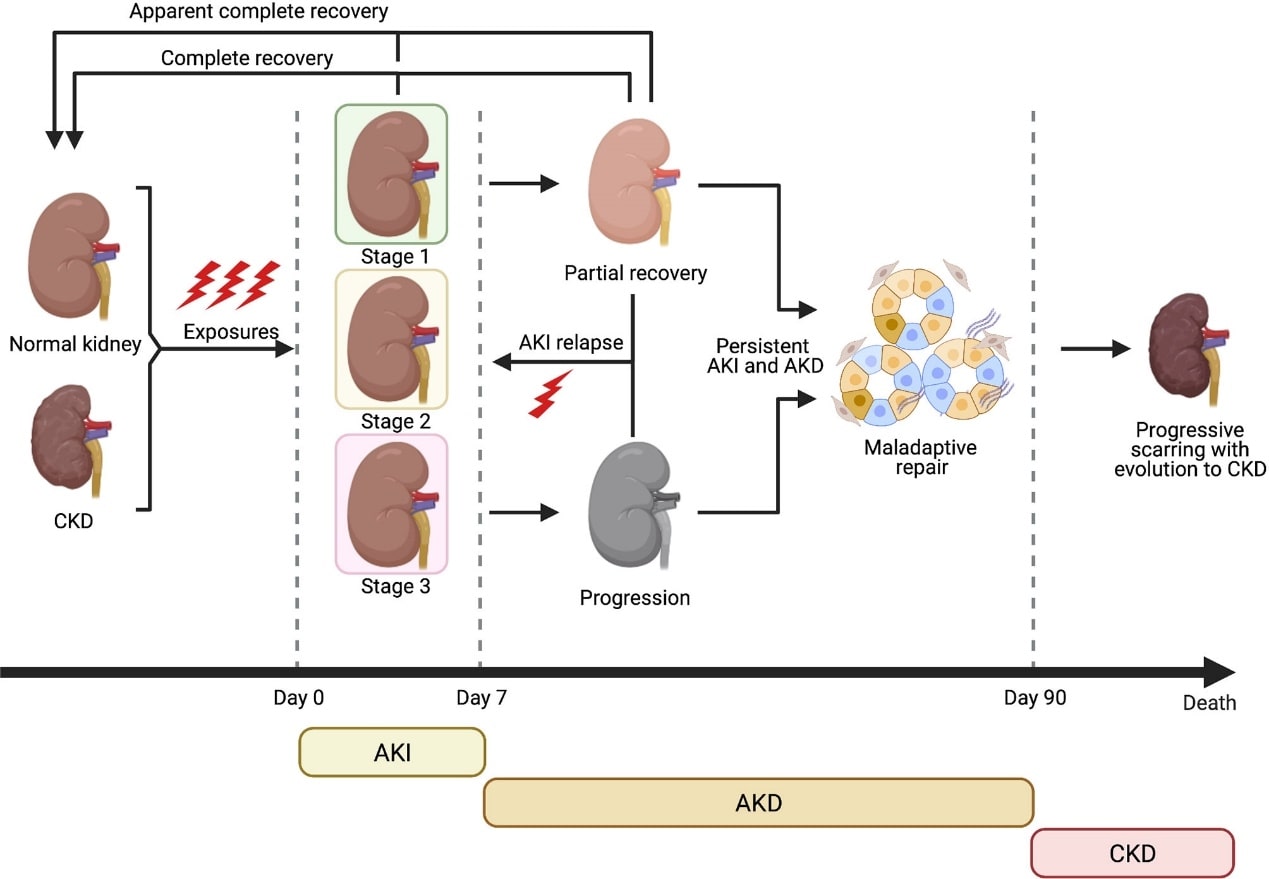Therapeutic Exosomes for Acute Kidney Injury
Acute kidney injury (AKI) is a common clinical emergency. AKI is extremely harmful to human health and occupies a lot of public medical resources. In addition, the number of patients with AKI is very large. Therefore, AKI is considered to be an important public health problem worldwide. A large number of studies have shown that stem cell-derived exosomes can treat kidney diseases including AKI. Creative Biolabs has always been the world's leading exosome service provider and is always looking forward to working with customers on the research and development of exosome drugs.
Etiology and Course of Acute Kidney Injury (AKI)
AKI is a clinical syndrome caused by a rapid decline in renal function in a short period. AKI has high morbidity, recurrence, and mortality. AKI is manifested by a rapid decrease in glomerular filtration rate (GFR) and urine output, a rapid increase in nitrogenous wastes such as creatinine and blood urea nitrogen, and disturbances in water-salt and acid-base homeostasis. The severity of AKI is classified from mild stage 1 to most severe stage 3 according to serum creatinine value and urine output. The etiology of AKI is complex and diverse and can be divided into prerenal, renal, and postrenal types according to the anatomical site of the etiology. Prerenal AKI refers to a progressive decrease in blood perfusion in the renal parenchyma caused by various reasons, resulting in a progressive decrease in GFR. Renal AKI refers to damage to the renal parenchyma from various causes, including unresolved renal ischemia and damage to the glomerulus, tubules, renal interstitium, and renal microvessels. Postrenal AKI refers to urinary tract obstruction caused by various reasons. The causes of obstruction can be roughly divided into intrarenal, extrarenal, and urethral obstruction. AKI is usually reversible. In some patients with AKI, the damage resolves completely, but some develop chronic kidney disease (CKD).
 Fig.1 Clinical course of AKI and evolution towards CKD.1,2
Fig.1 Clinical course of AKI and evolution towards CKD.1,2
Exosomes for the treatment of AKI
Currently, hemodialysis and kidney transplantation are the main treatments for AKI. However, the above methods have shortcomings such as shortage of kidney sources and high price, and cannot significantly improve the survival rate of patients. Therefore, there is an urgent need to find new and effective therapeutic strategies. Necrosis and apoptosis of renal tubular epithelial cells are the main causes of AKI. The repair after AKI mainly relies on the proliferation and redifferentiation of residual tubular epithelial cells to rebuild the integrity of tubular structure and function. Accumulating evidence has shown that various stem cell-derived exosomes may be effective in the treatment of AKI by promoting angiogenesis, reducing oxidative stress injury, promoting renal tubular epithelial cell proliferation, inhibiting inflammation, and inhibiting fibrosis, thereby protecting the kidneys.
Free radicals generated by oxidative stress can directly act on renal tubular epithelial cells, causing peroxidation of biofilms, denaturation of cellular proteins and enzymes, and DNA damage. This leads to necrosis or apoptosis of tubular epithelial cells, which in turn triggers AKI. In a rat model of ischemia-reperfusion AKI, the treatment of renal-derived mesenchymal stem cell-derived exosomes (RMSCs-Exo) increased renal blood flow and promoted angiogenesis. In the cisplatin-induced rat AKI model, the treatment of human umbilical cord mesenchymal stem cells -derived exosomes (hucMSCs-Exo) can reduce DNA oxidative damage products and inhibit the expression of apoptosis-related genes such as caspase 3 and Bax. This suggests that exosomes can exert renal protection through anti-oxidative stress and anti-apoptosis.
Numerous studies have shown that stem cell-derived exosomes can repair tissue damage through immunomodulatory effects. Meanwhile, inflammation is an important cause of AKI. A research team extracted the exosomes of human-induced pluripotent stem cell-derived mesenchymal stem cells (hIPSC-Exo). In a mouse model of ischemia-reperfusion AKI, injection restriction of hIPSC-Exo reduced serum creatinine levels, tubular necrosis, apoptosis, inflammatory cytokine production, and oxidative stress. Renal fibrosis is one of the hallmarks of the exacerbation of AKI. In a rat model of unilateral ureteral obstruction, milk fat globule–epidermal growth factor 8 (MFG-E8) in bone marrow mesenchymal stem cell-derived exosomes (BMSCs-Exo) alleviates renal fibrosis by inhibiting the RhoA/ROCK pathway. In conclusion, various stem cell-derived MSCs-Exo is expected to be applied in the treatment of AKI.
Creative Biolabs has been paying attention to exosome drugs related to kidney disease and has been improving the technical level of exosomes. Please do not hesitate to contact us to discuss your ideas and needs. Our chief scientist is constantly following up on your project to achieve your goals.
References
-
Quaglia, M.; et al. Stem Cell-Derived Extracellular Vesicles as Potential Therapeutic Approach for Acute Kidney Injury. Frontiers Immunology. 2022, 13:849891.
-
under Open Access license CC BY 4.0, without modification.
For Research Use Only. Cannot be used by patients.
Related Services:

 Fig.1 Clinical course of AKI and evolution towards CKD.1,2
Fig.1 Clinical course of AKI and evolution towards CKD.1,2









